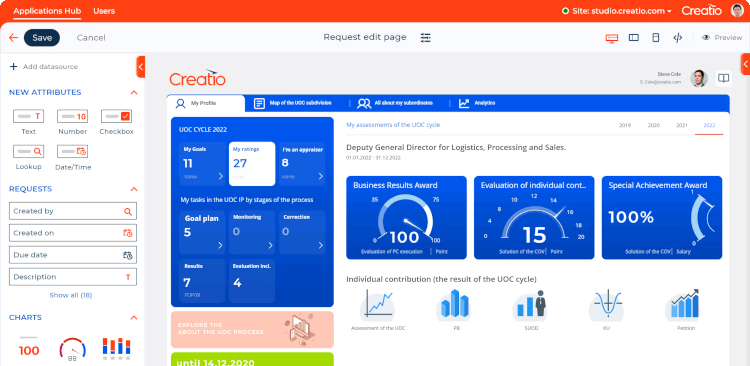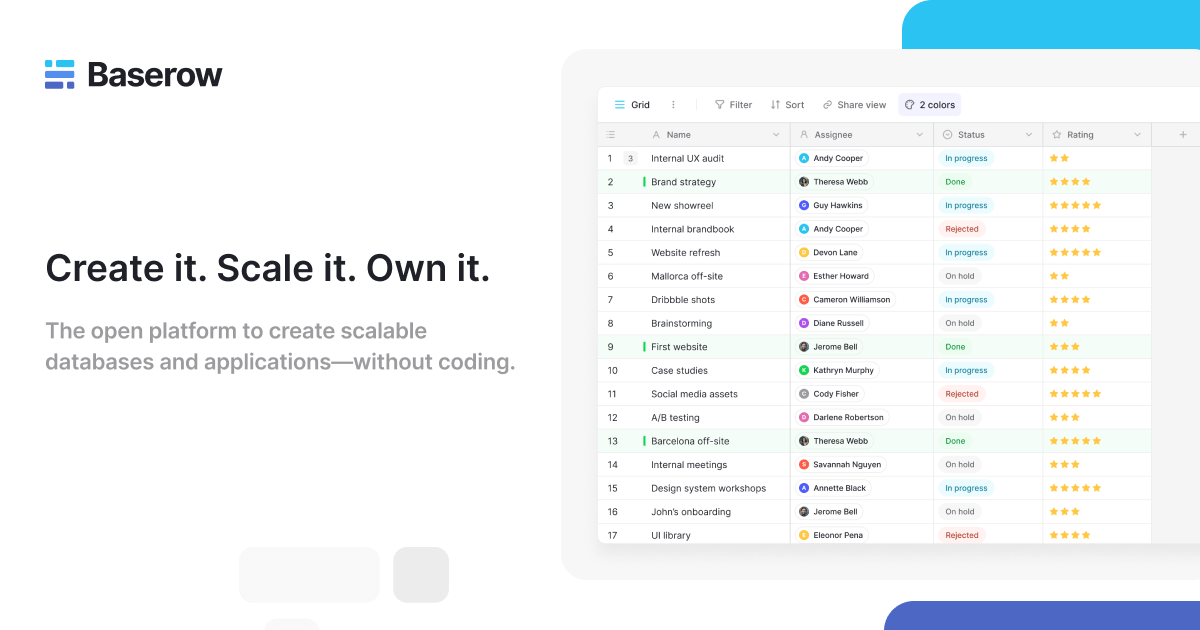How No-Code Equipment Simplify Open Platform Database Creation for Everyone
How No-Code Equipment Simplify Open Platform Database Creation for Everyone
Blog Article
Checking Out the Advantages of Scalable Databases That Call For No Coding Skills for Effective Information Monitoring Solutions
The emergence of scalable databases that eliminate the need for coding skills provides a transformative chance for companies looking for efficient data management remedies. As we consider the ramifications of such innovations, it comes to be vital to examine exactly how they can reshape the landscape of data management and drive lasting development in a competitive atmosphere.
Improved Ease Of Access for Users
Boosted accessibility for customers is an essential aspect of scalable data sources, making sure that information management systems are user-friendly and straightforward. In a period where data-driven choices are paramount, availability enables a wider series of users, including those without substantial technical expertise, to involve with data source systems successfully. This democratization of data accessibility helps with improved collaboration throughout divisions, equipping workers to extract insights and make notified decisions.
Straightforward interfaces, such as aesthetic information and drag-and-drop attributes depiction, streamline complicated data communications. These improvements decrease the learning curve related to typical data source management, allowing users to concentrate on leveraging data instead than grappling with technological complexities. Moreover, scalable databases commonly integrate customizable dashboards and real-time analytics, supplying individuals with prompt understandings customized to their particular demands.

Cost-Effectiveness and Source Cost Savings
Effective information management not just pivots on access yet likewise on cost-effectiveness and source cost savings. Scalable databases made for customers without coding skills substantially lower economic concerns generally related to conventional database monitoring systems. By getting rid of the requirement for specialized shows expertise, companies can assign their sources more efficiently, concentrating funds on core service tasks instead of considerable training or hiring competent workers.
Furthermore, these data sources usually utilize cloud-based services, which further lower costs related to equipment and upkeep. Organizations can scale their data source options according to their demands, preventing the expenses sustained from over-provisioning resources. This versatility suggests services can adapt to transforming demands without sustaining unnecessary costs, leading to considerable long-lasting cost savings.
In addition, easy to use interfaces enhance information entrance and management procedures, minimizing the moment invested in administrative tasks. This effectiveness translates into labor price financial savings, enabling teams to concentrate on critical campaigns rather than routine upkeep. Overall, taking on scalable data sources that require no coding abilities fosters an extra affordable approach to data monitoring, allowing companies to maximize their resources while maintaining high levels of operational efficiency.
Improved Partnership Across Teams

Additionally, scalable databases promote smooth communication among employee. With user-friendly user interfaces that call for no coding skills, employees can conveniently create, customize, and share reports or dashboards customized to their particular needs. This democratization of data empowers non-technical individuals to contribute insights, improving the collective setting.
Additionally, these databases support concurrent accessibility, enabling numerous users to work with the same dataset at the same time. This feature enhances efficiency, as teams can take part in joint information evaluation without the threat of version control issues. The capacity to leave remarks or notes directly within the data source better advertises dialogue and makes clear data analyses.
Streamlined Information Management Processes
In today's data-driven setting, companies recognize the necessity of streamlined data monitoring refines to optimize performance and accuracy. By leveraging scalable data sources that call for no coding abilities, businesses can streamline their data handling and minimize the intricacies commonly related to standard database systems. This availability empowers non-technical users to engage straight with information, promoting quicker decision-making and lowering dependence on specialized IT employees.
Structured information visit homepage administration procedures boost process by automating routine tasks such as information entrance, validation, and reporting. Automated information combination guarantees that information from numerous sources is accumulated flawlessly, removing silos and promoting a merged view of important organization metrics (no-code). Straightforward user interfaces enable personnel to control information easily, enabling them to generate understandings that drive strategic initiatives without the need for substantial training.
This performance not only increases functional procedures advice but additionally minimizes the potential for human error, making sure that information continues to be dependable and precise. Eventually, structured information administration processes with scalable data sources lead to enhanced performance, allowing organizations to concentrate on core activities while making certain that their data monitoring practices are efficient and effective.
Scalability for Growing Businesses

For broadening business, the capability to scale up or down is critical. A scalable database can deal with an increase of data created from new clients, items, or services, making certain that business operations stay undisturbed. These databases supply the capability to take care of peak loads successfully, which is crucial during durations of quick growth or seasonal spikes.
Furthermore, several scalable database options are developed with user-friendly user interfaces that need no coding abilities, encouraging non-technical personnel to handle information efficiently (no-code). This democratization of information administration enables companies to designate sources tactically and minimize dependence on specialized IT employees
Inevitably, embracing a scalable database not just improves operational performance yet likewise promotes an environment where services can evolve and introduce without the constraints of typical data source systems. This useful source flexibility positions organizations for long-term success in today's affordable landscape.
Verdict
In verdict, scalable databases that call for no coding skills offer significant benefits for efficient data administration. By simplifying information monitoring processes and providing scalability for growing companies, such options allow organizations to adapt to transforming needs successfully.
Boosted ease of access for users is a crucial aspect of scalable data sources, guaranteeing that data management systems are instinctive and straightforward.User-friendly interfaces, such as drag-and-drop attributes and aesthetic data depiction, streamline intricate data communications. In general, adopting scalable databases that need no coding skills cultivates an extra cost-efficient strategy to information management, allowing organizations to maximize their sources while maintaining high levels of operational effectiveness.
By leveraging scalable data sources that call for no coding abilities, organizations can simplify their data handling and minimize the complexities commonly associated with conventional database systems - no-code.Streamlined data management procedures improve operations by automating regular jobs such as information entry, recognition, and reporting
Report this page